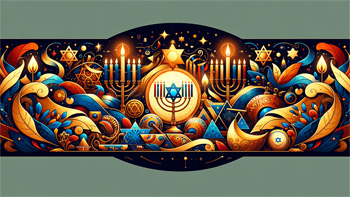Jewish holidays, integral to the practice of Judaism, are imbued with deep historical and religious significance. These special days transcend mere commemoration, serving as living traditions that continually shape the cultural and spiritual identity of those in the Jewish faith. Each holiday, rich in unique customs, rituals, and meanings, offers a window into the essence of Judaism and its way of life.
Rosh Hashanah: The Jewish New Year
Rosh Hashanah, the Jewish New Year, is a time of reflection and introspection. Marking the beginning of the Jewish High Holy Days, it is celebrated on the first two days of the Hebrew month of Tishrei. Rosh Hashanah involves the sounding of the shofar (ram's horn), symbolizing a call to repentance. Traditional foods like apples dipped in honey are eaten to symbolize the hope for a sweet new year. This holiday is a time for prayer, self-examination, and resetting one's moral compass for the year ahead.
Yom Kippur: Day of Atonement
Yom Kippur, the holiest day in the Jewish calendar, falls ten days after Rosh Hashanah. It is a day dedicated to atonement and repentance. On Yom Kippur, Jews fast for 25 hours, abstain from physical pleasures, and spend the day in prayer and reflection. It is a time for seeking forgiveness and making amends. The day concludes with the Neilah service and the final blowing of the shofar, marking the end of the fast and the hope for forgiveness.
Sukkot: The Feast of Tabernacles
Sukkot, also known as the Feast of Tabernacles, is a week-long festival that commemorates the Israelites' journey in the wilderness after their exodus from Egypt. Jews build temporary shelters called sukkahs, where they eat, and sometimes sleep, throughout the holiday. The sukkah represents the fragility and transience of life. Sukkot is a time of joy and gratitude, celebrated with the shaking of the lulav (palm frond) and etrog (citron), symbolizing unity and the bounty of the harvest.
Hanukkah: The Festival of Lights
Hanukkah, the eight-day Festival of Lights, celebrates the rededication of the Second Temple in Jerusalem and the miracle of the oil that burned for eight days. It is observed by lighting the menorah, playing dreidel, and eating foods fried in oil, like latkes and sufganiyot (jelly doughnuts). Hanukkah is a festive time, emphasizing the themes of resilience, freedom, and the triumph of light over darkness.
Purim: The Feast of Lots
Purim commemorates the salvation of the Jewish people from Haman's plot to destroy them, as recounted in the Book of Esther. It is a joyous festival marked by the reading of the Megillah (the Book of Esther), giving charity to the poor, sending gifts of food to friends, and enjoying a festive meal. Purim is known for its spirited and lively celebrations, including dressing up in costumes and the tradition of masquerading.
Passover: The Festival of Freedom
Passover, or Pesach, celebrates the Exodus of the Israelites from Egyptian slavery. It is observed for seven or eight days, beginning on the 15th of the Hebrew month of Nissan. The highlight of Passover is the Seder, a ritual meal where the story of the Exodus is recounted. Matzah (unleavened bread) is eaten to remember the haste with which the Israelites left Egypt. Passover is a time of family, tradition, and remembering the struggle for freedom and dignity.
Shavuot: The Feast of Weeks
Shavuot, also known as the Feast of Weeks, occurs seven weeks after Passover and marks the giving of the Torah at Mount Sinai. It is celebrated by studying Torah, reading the Book of Ruth, and enjoying dairy foods. Shavuot underscores the centrality of Torah in Jewish life and the ongoing commitment of the Jewish people to learning and moral conduct.
Tisha B'Av: A Day of Mourning
Tisha B'Av is a solemn day of mourning that commemorates various tragedies in Jewish history, most notably the destruction of the First and Second Temples in Jerusalem. It is observed with fasting, the reading of the Book of Lamentations, and refraining from joyous activities. Tisha B'Av is a day of reflection on the themes of loss, destruction, and the resilience of the Jewish spirit through adversity.
Jewish holidays offer a deep insight into the rich traditions and spiritual values of the Jewish community. They are times for celebration, reflection, and reconnection with the past. Through these observances, Jewish people not only remember significant historical events but also reinforce the continuing relevance of their faith and traditions in contemporary life.
